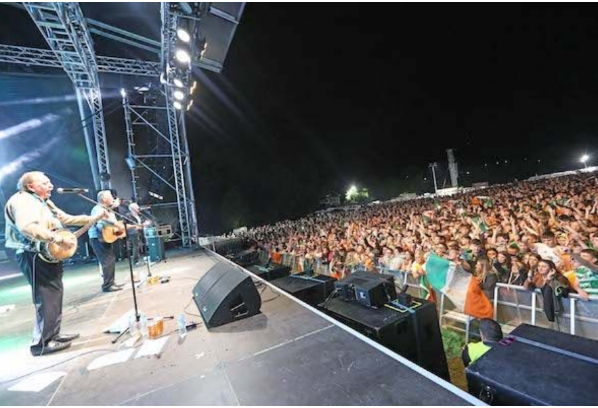
The Wolfe Tones are one of Ireland’s oldest and most successful bands. Founded in 1963, the band is still going strong with tour dates around Ireland in spring of 2023, although the three remaining members Brian Warfield, Tommy Byrne and Noel Nagle are now approaching their eighties. Warfield and Byrne recently gave an interview on an Irish entertainment favourite, the The Two Johnnies Podcast ‘Ep. 265 The Wolfe Tones’ (27:25-53:00), which was published exclusively on Spotify on the 13th of March 2023. During this interview the Wolfe Tones shared their views on peace and peacebuilding in Ireland, disputing their status as a ‘rebel’ band, but questioning those who call for an end to inflammatory rhetoric in popular media. As an Irish person, this interview made me consider the role that music and popular media have on my understanding of peace and peacebuilding, highlighting a tension between artistic and storytelling processes and conflict in the country.
In the cannon of Irish music, rebel songs are ballads and folk songs which tell the story of rebellion, particularly against British occupation. Because of this, rebel songs have a history of association with Irish nationalism and republicanism, most recently with the Troubles in Northern Ireland, and given this provenance, it is unsurprising that the Wolfe Tones try to distance themselves from the tradition in this interview. Interestingly, rather than doing this by denying the thematic similarity of their music and rebel songs, the Wolfe Tones question the term ‘rebel song’, making the case that they are just ‘the songs you learned in school’, which ‘only became rebel songs after 1969/1970’, as the Troubles intensified (Tommy 43:12-43:28). By taking this stance, the Wolfe Tones attempt to distance their own music from the violent connotations of rebel music, but they also try legitimise rebel songs as part of Irish cultural history, a tradition passed down through generations, which belongs to the realms of cultural practice. The Wolfe Tones deepen this connection arguing, ‘I wouldn’t call them a rebel song they’re just Irish songs; we, we tell the story of Ireland, every aspect of it, the good, the bad, the ugly’ (Tommy 43:29-43:47). This argument, while again cementing rebel songs as a part Irish cultural history, also tries to strip them of their inherent political undertones and re-frame them as solely storytelling devices.
This conceptualisation of rebel songs is instrumental in the Wolfe Tones’ argument against what they call ‘the cranks in Ireland’ (Brian 44:43-44:36), since they use this rhetoric to discredit those who suggest that their music is detrimental to peace-building practices, reimagining them as critics of Irish culture and cultural practices. The Wolfe Tones and their music have also been the subject of criticism in the Republic of Ireland, one example being a controversial video of the Irish women’s soccer team again singing the chorus of the ‘Celtic Symphony’ following victory over Scotland during the World Cup Qualifiers in 2022. When asked about this incident, the band insisted that the song was not a rebel song, suggesting that those who were offended by the act, did not understand the message behind the song, shouting ‘Listen, listen listen to the words!’ and ‘They don’t understand! They don’t understand!’(Brian and Tommy 34:19-34:22). Explaining that the ‘Celtic Symphony’ is based on graffiti found on the walls of Glasgow, the band claims that the responsibility for any offence caused lies with the ‘cranks’, who falsely conceptualise their music as rebel songs and have failed to understand the true meaning of the music, rather than with the football team or with the band itself. As an Irish person, the demonisation of people unwilling to accept inflammatory actions in media is concerning, as those who visualise peace on the island as mutual cooperation and acceptance are made into enemies of Irish culture and history, discouraging further reconciliation and peace-making on the island of Ireland.

In fact, the Wolfe Tones’ music has already made many a splash in Northern Irish politics. The band is a regular performer at the annual West Belfast summer arts festival ‘Féile an Phobail’ (‘The Peoples’ Festival’) and the performance of their song ‘Celtic Symphony’ and its chorus ‘ooh, ahh, up the raa’ have been known to cause consternation in the Belfast Protestant community. The Wolfe Tones describe this conflict in the following manner:
‘The DUP you know every single year they come up with the same thing you know, it’s , eh, they, they focus in on ‘ooh ahh up the raa’ and eh, you know about, they bring, they bring somebody on the radio show somebody that, eh, whose father was killed in, eh you know, in memory of the RUC or was killed by the IRA blah blah blah and what do you think of the song now, this band singing ‘ooh ahh up the raa’ your dad was killed by them, you know that kind of thing they’re focussing in on that, forgetting about the other side of the story forgetting about you know, nationalist community that were persecuted.’ (Brian 42:16-42:53)
This statement demonstrates the divisive power of the Wolfe Tones’ music, dismissing the legitimate grief of families who lost loved ones to IRA violence, while conceptualising Irish Catholics as key victims of the conflict. While it is undeniable that the Catholic Irish community in Northern Ireland faced many challenges and experienced much suffering, the Wolfe Tones’ competitive victim narrative cannot be said to promote cross-community cooperation and reconciliation in Northern Ireland.
While I am not suggesting that the Wolfe Tones are actively trying to destabilise peace in Ireland, the rhetoric in their music and in this interview shape visualisations of peace and peace-building in Ireland in a negative way by legitimising provocative media as pieces of Irish cultural history and dismissing those who criticise this as ignorant. Revolution has certainly shaped Ireland and its impact on our past cannot and should not be ignored. However, critical examination of the most productive paths to peace must be undertaken to understand the role of rebel songs and other relics of the revolutionary period in our today and tomorrow. Challenging conflict’s presence in Irish cultural products and definitions of Irishness – and challenging the role of Irish cultural products in perpetuating some aspects of conflict – may be a good place to start.
What do you think?
- Do artists and musicians have a responsibility to create peace-promoting art? Or at least a responsibility to create art that does not drive conflict?
- How do you define peace-promoting art and who should get to decide what ‘peace-promoting’ is? Where would you draw the line between art/songs that reflect on past struggles and art/songs that potentially perpetuate those struggles?
- What is at stake in arguing that interpretation is simply down to the listener, not the artist? And what is the impact of suggesting that audiences who find aspects of art/song uncomfortable are just ‘misunderstanding’ it?
- How can a conflict-filled past be remembered in a way that does not glorify war or create tensions in the present day?
- Is it possible to create peace in post-conflict societies while potentially divisive rhetoric is consumed through media? How might this interact with free-speech?
- How can artists revive and celebrate cultural traditions without promoting nationalism or engaging in combative victimhood?
If you enjoyed this item in our museum…
You might also enjoy ‘Fractured Peace: a visual representation’, ‘Creating Peace in Post-Conflict Society‘, ‘Get Your Brits Out‘ and ‘Rapping for Empathy‘.
Aimée Capraro, April, 2023
References
- Jessica Senehi, “Constructive Storytelling: A Peace Process” Peace and Conflict Studies 9, no. 2 (2002): 41-63.